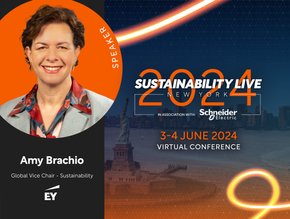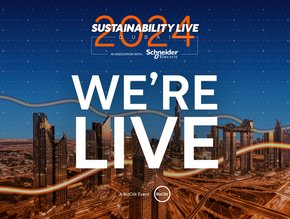Samsung Biologics’ sustainability agenda for biopharma

The health concerns of greenhouse gas (GHG) emissions seems to fall by the wayside in the overall sustainability conversation. More importantly, the very industries that seek to support the general population with healthcare have their own emissions to account for, particularly in the biopharma sector that contributes around 5% of global GHGs.
So, this raises the question: how can biopharma reduce its environmental impact and set an example for the industry? The largest contributing factor to overall healthcare emissions is the supply chain, which makes up 50% of its carbon footprint. Failure to introduce new methods of decarbonisation across the industry effectively makes it a closed loop system that is responsible for the impacts on its own clients—so to speak.
Jimin Han (JH), Director of Sustainability at Samsung Biologics, shares insights on biopharma’s sustainability impacts and how the industry can reduce its emissions to eliminate the impacts of healthcare on the planet, and people.
How does sustainability impact biopharma?
JH: Transitioning to meet net-zero GHG ambitions involves changes across the healthcare industry, with a number of challenges hindering the progress to sustainable solutions, including:
- Strict regulatory requirements: Drug development and manufacturing are subject to strict regulations. As “the process is the product,” changing manufacturing and production processes to reduce their direct and indirect emissions requires validation testing to ensure minimal impact on the drug’s safety and efficacy.
- Vast supply chain networks: The complexity of supply also means access to and influence over the entire chain is unlikely, limiting control over reducing GHG emissions of the supply chain. Network complexity also results in difficulties when calculating the emission factor of raw materials. To successfully reduce emissions, action needs to be taken by each contributor at each stage of supply.
- Cost of sustainable alternatives: Introducing systems with the intent of reducing carbon emissions can have high initial associated costs. This often results in many companies buying carbon offsets or paying carbon taxes. But with the rising costs of carbon, this is not a long-term solution.
- Geographic limitations: The low availability of sustainable systems in key geographies, such as limited access to renewable electricity in the Asia Pacific region, leads to challenges in decarbonisation.
However, the biopharma industry must transform to increase production sustainability, which in turn can result in increased efficiency and reduced costs over time.
Established as part of the sustainable markets initiative (SMI) launched by His Majesty King Charles III at the World Economic Forum in 2020, the health systems task force aims to accelerate the transition to net-zero healthcare. Through a series of published works, a public-private partnership task force made up of industry and healthcare leaders has outlined actions that can be adopted by healthcare stakeholders to advance the industry towards the shared goal of net-zero operations, focusing on:
- Supply chains: Collaboration across the supply chain to introduce systems to advance decarbonisation, such as renewable energy, clean heat and green transportation logistics.
- Patient care pathways: Driving reduction in emissions across patient care to lower disease progression and identifying opportunities for decarbonisation while improving patient care.
- Digital innovation in clinical research: Leveraging the digital transformation across the biopharma industry to support and accelerate progress to net-zero transitions.
These measures aim to overcome challenges and help the healthcare industry reach sustainability targets.
As supply chain emissions are one of the largest GHG contributors in the healthcare sector, reducing them remains a priority. This task relies heavily on collaboration between supply partners, with changes throughout raw material extraction, product synthesis, packaging and transport necessary to meet decarbonisation ambitions. Free-flowing communication and individual contributor transformations through increasing manufacturing efficiency, renewable energy, clean transport and energy-efficient facilities drive supply chain sustainability.
Aided by innovative technologies, more efficient manufacturing operations can streamline production and decrease costs, striving for sustainability while overcoming economic barriers to sustainable healthcare. In addition to improving processes, it is important to transition to 100% renewable energy sources through other means to overcome validation challenges in biologics manufacturing. Converting to zero-emission energy with tools such as power purchase agreements, renewable energy certificates and transport vehicles, as well as collaborating with suppliers to decarbonise the supply chain, are all methods that can be leveraged to reduce GHG emissions.
Is it possible for the healthcare industry to be sustainable?
JH: Bringing insight into sustainable solutions, collaboration and partnership across the healthcare sector is crucial to reduce GHG emissions.
Working to overcome challenges, establishing and disclosing goals aligned with sustainability targets sets timeframes and specific actions. Disclosing progress year after year, in addition to documenting measurables, solidifies the transformation to sustainable solutions.
*************************************************
For more insights into Sustainability - check out the latest edition of Sustainability Magazine and be sure to follow us on LinkedIn & Twitter
Other magazines that may be of interest - EV Magazine | Energy Digital
*********************************************
Sign up to the The Global Sustainability & ESG Awards 2024, coming to London on the 11th September 2024.
Net Zero LIVE will be hosted live from the QEII Centre, London on the 6th and 7th of March, and streamed globally via our virtual event platform Brella. Net Zero LIVE London will feature four LIVE themes, incorporating Sustainability LIVE, EV LIVE, Scope 3 LIVE, and Energy LIVE to deliver a holistic conference and exhibition experience with opportunities to connect with like-minded peers and actively contribute to crafting a sustainable future. Following Net Zero LIVE, viewers can also sign up for Sustainability LIVE Dubai and Singapore.
*********************************************
BizClik is a global provider of B2B digital media platforms that cover 'Executive Communities' for CEO's, CFO's, CMO's, Sustainability Leaders, Procurement & Supply Chain Leaders, Technology & AI Leaders, Cyber Leaders, FinTech & InsurTech Leaders as well as covering industries such as Manufacturing, Mining, Energy, EV, Construction, Healthcare + Food & Drink.
BizClik, based in London, Dubai & New York offers services such as Content Creation, Advertising & Sponsorship Solutions, Webinars & Events.






